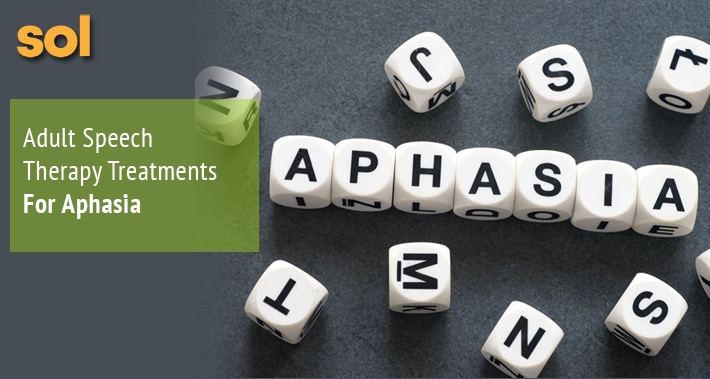
Being able to communicate with others is an important part of our social lives.
However, certain language disorders, such as aphasia, can affect our ability to communicate effectively.
If you or a loved one has recently been diagnosed with aphasia, you know how stressful and frustrating it can be.
However, there is help.
Speech therapy services for adults with a focus on aphasia can help you manage your speech disorder and recover much of your speech skills.
Let’s take a closer look.
What Is Aphasia?
Aphasia is a language disorder that can occur after brain damage.
Aphasia makes it difficult to understand and use spoken language, read, and write.
The level of impairment can depend on the location and extent of the damage to your brain.
Aphasia doesn’t affect intelligence, but rather makes it difficult to share your thoughts with others.
As a result, people with aphasia may be considered to be less intelligent as a result of communication issues, but this is simply not true.
This can be incredibly frustrating for somebody with aphasia, similar to the frustrations experienced by people with stuttering disorder – speech therapy can help in both scenarios.
Aphasia Symptoms
Aphasia can affect communication skills in multiple ways.
Aphasia’s effects on speech may include:
- Inability to think of the words you want to say
- Using a wrong, but related word (dog instead of cat) or a word that is completely unrelated (pillow instead of cat)
- Using made up words
- Only being able to speak in short or incomplete sentences
Aphasia’s effects on understanding may include:
- Difficulty understanding what others are saying, specifically when they are speaking fast or in longer sentences
- Difficulty understanding conversations in a group setting
- Difficulty understanding jokes
Aphasia’s effects on reading and writing may include:
- Difficulty reading books, forms, and computer screens
- Difficulty spelling and putting words together to write sentences
- Difficulty doing math and using numbers to tell time or count
What Causes Aphasia?
Aphasia is caused by damage to the left side of the brain, specifically the area that controls language.
Strokes are the most common cause of aphasia, but it can also be caused by any type of brain damage, such as tumors, traumatic brain injuries, and brain disorders that worsen over time.
Temporary episodes of aphasia may also occur after migraines or seizures.
Speech therapy for children with aphasia does exist, but it’s far less common than for adults.
This is because it’s extremely rare for a child to have a stroke, though they can experience brain tumors or traumatic brain injury.
Related: How To Tell If Your Child Has A Speech Or Language Disorder
Speech Therapy Testing & Evaluations For Aphasia
To find out whether you have aphasia, you can visit our speech therapy clinic to test your speech and language skills.
Your speech therapist may test how well you:
- Understand words, questions, directions, and stories
- Engage in conversation
- Name common objects
- Say words and sentences
- Read and write, as well as answer questions about something you’ve read or heard
- Follow instructions
- Answer yes/no questions about common objects
- Find other ways to share your thoughts when you have trouble talking (pointing or using gestures or drawings)
How A Speech Therapist Can Help Treat Aphasia
While the main treatment for aphasia is speech therapy, the specific type of treatment depends on the causes of your aphasia, as well as your wants and needs.
Your speech therapist will help you relearn and practice language skills as well as learn other ways to communicate.
Your speech therapist can work with you alone or in small groups, and may also include your family in your treatment in order to help you practice your skills at home.
Depending on the type of treatment, special equipment, such as a computer, may be needed to help you communicate.
Let’s look at some of the treatment options for individuals with aphasia.

1. Community Support
Joining a support group for individuals with aphasia can help practice speech and language skills in a natural setting as well as help broaden social networks.
Support groups can also provide individuals living with aphasia and their families with the chance to socialize, as well as aphasia education and resources.
2. Melodic Intonation Therapy (MIT)
Despite its debilitating effects on speech, aphasia does not generally affect one’s ability to sing.
Thus, MIT uses the musical elements of speech, such as rhythm and melody, to improve language skills.
This treatment option is commonly used to treat individuals with severe aphasia.
Individuals begin this therapy by singing simple phrases and gradually learn to sing longer phrases.
After a while, reliance on singing is gradually decreased.
3. Constraint Induced Language Therapy (CILT)
CILT offers an intensive treatment option for individuals looking to improve their spoken language skills.
This therapy was derived from “constraint induced movement therapy”, which is a therapy that focuses on increasing function of an injured limb by restricting the usage of non injured limbs.
CILT prioritizes the development of spoken language skills and discourages the use of compensatory communication strategies, such as writing or pointing.
4. Augmentative and Alternative Communication (AAC)
Augmentative and Alternative Communication (AAC) uses both aided and non-aided symbols alongside or instead of speech and language.
Aided symbols, such as pictures, drawings, or physical objects, require the use of speech-generating communication devices.
Non-aided symbols, such as gesturing and pointing, only requires your body.
The strategies and devices used in AAC can be used temporarily until language skills improve, or, for cases of severe aphasia, permanently.
What To Do If A Loved One Has Aphasia
If someone you love is struggling with aphasia, you can help them by:
- Speaking in short, simple sentences and slowing your pace
- Keep conversations one on one
- Allow the person time to respond
- Don’t finish their sentences or correct their errors
- Reduce distracting noises
- Keep a pen and paper on hand
- Write a key word or short sentence to help explain a concept
- Help create a book of words, pictures, and photos to assist in conversation
- Use drawings or gestures when you aren’t understood
- Involve the person with aphasia in the conversation as much as possible
- Check for to make sure the conversation was understood and summarize what was discussed
Book Your Appointment With Sol Speech and Language Therapy Today
If you or someone you love is struggling with aphasia, we can help.
At Sol Speech and Language Therapy, we’re committed to helping you develop your speech and language skills to their fullest capacity.
Speak with one of our licensed speech pathologists, by booking your consultation at any one of our locations.
Book your appointment with Sol Speech and Language Therapy today.
6448 E Hwy 290 Suite E-108,
Austin, TX 78723
(512) 368-9488
» https://g.page/r/CfRfhOpEQm7BEAE
Sol Speech & Language Therapy
555 Round Rock W Dr E-221,
Round Rock, TX 78681
(512) 808-3953
» https://g.page/r/Cb5pwCTosSEfEBM
Sol Speech & Language Therapy offers personalized skilled intervention to those struggling with their speech and language skills. Services offered include screening, consultation, and comprehensive evaluation. We also provide one-on-one and/or group therapy for speech sound disorders, receptive/expressive language delay/disorder, stuttering/cluttering, accent reduction, and much more.